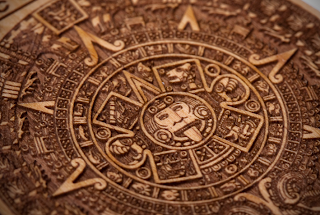The calendar measures quantities of time such as years, months, and days. One well known lunar calendar was created by the Mayans, a people who "revolved around the concept of time." (History of Mayan Culture) It was created in order to plan and determine agricultural and religious events. They used a vigesimal numbering system (base 20), which was most likely developed by counting the number of fingers and toes on a person. The Mayans were the first known successful civilization to determine the measure of a year and of a day.
 |
| Traditional Mayan calendar. |
The Gregorian calendar, which is most commonly used today in Western cultures, was developed by Pope Gregory XIII takes into account both lunar and solar forms of tracking time. It uses the lunar system in order to track religious and significant historical dates, while also using the solar method in order to accurately determine the change of time. It accounts for a leap year, unlike the others.
 |
| Gregorian calendar. |
Today, many people use calendars such as these to celebrate specific events, such as holidays, birthdays or anniversaries, as mentioned above. I just thought I'd post about time since my birthday is coming up and I thought it was interesting how people were able to document and pass on their knowledge about sequences of events!
I am definitely grateful for the widespread use of the Gregorian calendar today. In my Arabic classes, we learn not only the Arabicized names for the months of the Gregorian calendar and the actual Arabic names for those months (two different things), but also the months of the Islamic calendar, which is a lunar calendar, so it doesn't quite match up with ours. Learning three different sets of months and trying to keep track of how they all match up = highly inconvenient.
ReplyDeleteYa. Thank goodness for standardization of time in the western world. I've always thought that it was necessary to have the same length of year - or else you would end up with snow in the "summer" after enough cycles. But i guess that our month is pretty generic though. It has something to do with the moon i guess but we could change the length of months without much difference.
ReplyDeleteI just got to thinking though of the importance of the 7 day week in Christian Jewish and Muslim religions and wondered if any cultures ever used a different length week. Well it seems that there are a few even though the 7 day week is pretty universal. THIS SITE talks a bit about that. I found it interesting that the soviet union used a few different lengths of weeks but never 7. My guess is that it was to discourage christianity and religion.
good point Michael. I think that might tie it back into the folk knowledge aspect. People learned a particular attitude by observing how institutions dealt with other things. your example of the length of a week suggests that one thing, measuring dates, completely unrelated to another, views of religion and a supreme being, at least on surface value, contributed to the overall attitude of the country.
ReplyDeleteOne important way of transmitting knowledge in my home family was calendaring. Every Sunday we would meet and go over the calendar for the week. While it helped us schedule, the main lesson we learned was about being flexible and that how we budget our time reflects our priorities.